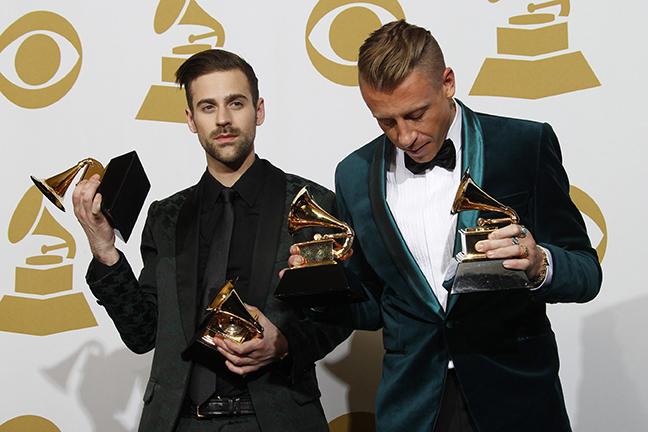In My Opinion: Macklemore humbly speaks our for minorities
Ryan Lewis & Macklemore won four awards, including Best New Artist, Best Rap Song, Best Rap Album backstage at the 56th Annual Grammy Awards at Staples Center in Los Angeles on Sunday, Jan. 26, 2014. (Allen J. Schaben/Los Angeles Times/MCT)
February 26, 2016
With the return of Macklemore & Ryan Lewis’ highly anticipated sophomore album on Feb. 26, 2016, past issues and questions concerning the duo’s influence, popularity and intentions have resurfaced.
Two years ago, Macklemore was apologizing for his success. In 2014, he took home Grammys for best new artist, best rap song, best rap performance and best rap album beating well-established artists like Jay Z, Kanye West, Drake and Kendrick Lamar. Macklemore posted a screenshot on Instagram. It was a text he sent to Lamar saying, “You got robbed. I wanted you to win. You should have.”
Macklemore felt it necessary to publicly apologize for his win because of several accusations his name and music were and still are attributed to.
With their first album, Macklemore & Ryan Lewis tackled the issue of marriage equality and homophobia with the single, “Same Love.” The song faced much criticism for its simple and uninformed lyrics like “when I was in the third grade I thought that I was gay, cause I could draw, my uncle was and I kept my room straight” and “A word rooted in hate, yet our genre still ignores it.”
This raised questions for how Macklemore became the face for hip hop’s gay rights activist when there is already an entire genre in place called homo hop. Homo hop, or also known as LGBT hip hop or queer hip hop, is defined as a subgenre to hip hop typically performed by LGBT artists. LGBT hip hop is a movement to make gay artists and performers’ presence known in the hip hop culture to promote awareness in popular music today.
Macklemore & Ryan Lewis released “Same Love” when the fight for marriage equality was at its peak, during the perfect storm of events. Also, the duo established a strong foundational following with their prior release, “Thrift Shop.” Combined, the track, “Same Love” became a notable force for the fight towards the legalization of gay marriage.
Critics and other artists frequently tear down Macklemore & Ryan Lewis’ music by using race as a reason for their popularity and success. Macklemore has openly responded to the accusations of race carrying his career saying that “the privilege that exists in the music industry is just a greater symptom of the privilege that exists in America.”
The duo by no means ignores accusations that their race is an advantageous position in the hip hop genre. It is impossible to not ask what Macklemore’s success would look like if he were African-American.
The reality is Macklemore & Ryan Lewis have entered into a genre and are fighting battles that are culturally not theirs. However, both hip hop and the battle for gay rights are not limited to its traditional members and both call for innovators and activists in support of their mission. Regardless of race or sexuality, Macklemore & Ryan Lewis create art that speaks to the volumes and persuades progress within our communities through the best way they know how: music.






